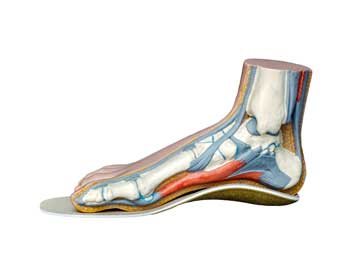
Foot care is one of the fastest growing, yet most neglected, areas of healthcare today. Abnormal foot function can lead to ankle, leg, knee, hip and even lower back problems. Orthotic therapy (custom inserts worn in shoes) is in the midst of major technological advancement. Metascan™, a computerized gait and pressure analysis system from Footmaxx (www.footmaxx.com), is an innovative diagnostic tool that analyses foot function when a patient stands, walks or runs across a mat. The result is a computerized gait analysis report that provides a thorough clinical assessment to help our physical therapists prescribe custom orthotics – literally within minutes.
The Footmaxx system will determine the type of foot dysfunction. To keep it simple, there are two foot types that can lead to dysfunction; low-arches and high-arches. Low-arches, or pes planus foot type is an excessively flexible foot that causes increased lower leg rotation (internal tibial rotation) leading to increased mechanical stress on the feet, knees, hips and spine.
Conversely, the high-arch, or pes cavus, foot type does not have enough flexibility in the foot, leading to decreased ability to absorb the impact forces that are generated through walking and running. This can lead to overuse injuries of the foot, knee and hip with increased risk for stress fractures.
Poor foot mechanics can be the underlying cause of many of the painful conditions that lead to altered function and poor quality of life.
Conditions commonly associated with poor foot mechanics.
Achilles Tendinitis: Swelling, painful to the touch, lack of flexibility along the back of the lower leg close to the heel.
Shin Splints: Throbbing or aching pain along the front of shin. Usually occurs during and/or following a prolonged run or walk.
Runner’s Knee: Swelling, Aching pain behind and/ or around kneecap, pain walking up and/or down stairs.
Plantar Fasciitis: Deep ache and/or sharp pain in bottom of heel. Most commonly felt in the morning or following prolonged sitting.
Piriformis Syndrome: Local pain and tightness in buttock with possible tingling or numbness down back of leg. Most noted during prolonged sitting.
IT (Iliotibial) Band Syndrome: Usually occurs after a short period of running with sharp pain on the outside of the knee.
Sacroiliac dysfunction: symptoms; Sharp, achy lower back pain on one side. Usually the pain is made worse with walking, running and movements from sit to stand.
So, if you are interested in being tested for mechanical foot problems or are limited by pain, please give us a call for a FREE phone consultation at (610)327-2600. Also, visit our website at: www.mishock.wpengine.com. Mishock Physical Therapy has 6 convenient locations to serve you in Skippack, Phoenixville, Gilbertsville, Limerick, Barto and Stowe!
* Phone Consultations are not applicable to patients in federal or state funded programs, such as Medicare and Medicaid.
* Screenings are consultations and do not involve a physical therapy evaluation or treatment.
Dr. Mishock is one of only a few clinicians with doctorate level degrees in both physical therapy and chiropractic in the state of PA.
